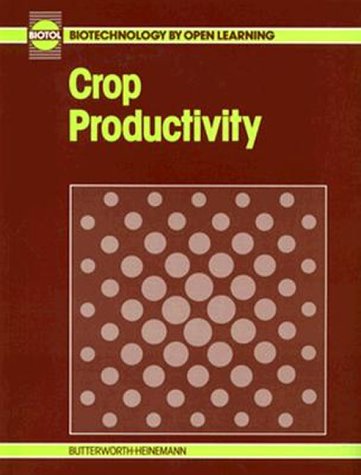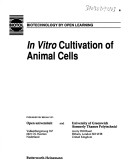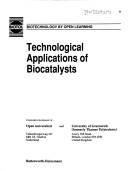Biotol S.
6 total works
Biotechnological Innovations in Chemical Synthesis
by B C Currell, R.C.E.Van Dam Mieras, and R.C.E. Van dam Mieras
Published 7 May 1997
Demonstrates how biological catalysis can be applied to the production of value added chemicals. Use is made of a diverse range of case studies to give a breadth of experience. It also reveals how bio-systems are being employed to produce a wide range of valuable commodities including antibiotics and other therapeutics, intermediary metabolites such as citrate, malate, gels and other valuable polymers.
Biotechnological Innovations in Energy and Environmental Management
by B C Currell, R.C.E.Van Dam Mieras, and R.C.E. Van dam Mieras
Published 1 April 1994
The discussion of the quantitative aspects of assessing growth and yield provide the basis for discussing the internal and external (environmental) factors which influence crop productivity. The text examines the effects of both abiotic and biotic
factors on crop yields and describes the issues involved in the production of crops in artificial environments. The diversification of crops, especially into the production of secondary products, is also described.
The need for a cost effective training scheme for new and existing staff at all levels has been met by the University of Greenwich (formerly Thames Polytechnic) and the Open University of the Netherlands. As part of the European Community Education and Technology Training initiative (COMETT) and in conjunction with a number of other leading UK and European universities, they are developing BIOTOL, a training scheme in biotechnology using open learning materials, which will provide tailor-made courses, flexible in content, pace and place.
factors on crop yields and describes the issues involved in the production of crops in artificial environments. The diversification of crops, especially into the production of secondary products, is also described.
The need for a cost effective training scheme for new and existing staff at all levels has been met by the University of Greenwich (formerly Thames Polytechnic) and the Open University of the Netherlands. As part of the European Community Education and Technology Training initiative (COMETT) and in conjunction with a number of other leading UK and European universities, they are developing BIOTOL, a training scheme in biotechnology using open learning materials, which will provide tailor-made courses, flexible in content, pace and place.
In Vitro Cultivation of Animal Cells
by B C Currell, R.C.E.Van Dam Mieras, and R.C.E. Van dam Mieras
Published 1 October 1994
Technological Applications of Biocatalysts
by B C Currell and R.C.E. Van dam Mieras
Published 28 January 1994
This work builds upon a knowledge of the properties of enzymes and shows how these important catalysts can be used in industry. The central theme demonstrates how proteins, especially enzymes and immunoglobins, can be isolated, characterized and produced on a large scale. Specific examples are given and both practical and theoretical aspects are examined. Applications for a wide range of metabolites are described with particular emphasis on the design, performance and production of biosensors. The book uses step-by-step logical development and a student-centred learning style. It is part of a series of biotechnology texts suitable for self-study or as the basis for in-house training schemes. It includes reference questions for students, highlighted key phrases, and a summary of objectives for each chapter. The need for a cost effective training scheme for new and existing staff at all levels has been met by the University of Greenwich (formerly Thames Polytechnic) and the Open University of the Netherlands.
As part of the European Community Education and Technology Training initiative (COMETT) and in conjunction with a number of other leading UK and European universities, they have developed BIOTOL, a training scheme in biotechnology using open learning materials, which provides tailor-made courses, flexible in content, pace and place.
As part of the European Community Education and Technology Training initiative (COMETT) and in conjunction with a number of other leading UK and European universities, they have developed BIOTOL, a training scheme in biotechnology using open learning materials, which provides tailor-made courses, flexible in content, pace and place.
Examines the central issues of plant physiology. Considers plants as functional units whose growth and development are influenced by their internal and external environment, the book begins with a discussion of plant anatomy to provide an understanding of the physical framework in which physiological processes operate.
The need for a cost effective training scheme for new and existing staff at all levels has been met by the University of Greenwich (formerly Thames Polytechnic) and the Open University of the Netherlands. As part of the European Community Education and Technology Training initiative (COMETT) and in conjunction with a number of other leading UK and European universities, they are developing BIOTOL, a training scheme in biotechnology using open learning materials, which will provide tailor-made courses, flexible in content, pace and place.
The need for a cost effective training scheme for new and existing staff at all levels has been met by the University of Greenwich (formerly Thames Polytechnic) and the Open University of the Netherlands. As part of the European Community Education and Technology Training initiative (COMETT) and in conjunction with a number of other leading UK and European universities, they are developing BIOTOL, a training scheme in biotechnology using open learning materials, which will provide tailor-made courses, flexible in content, pace and place.





